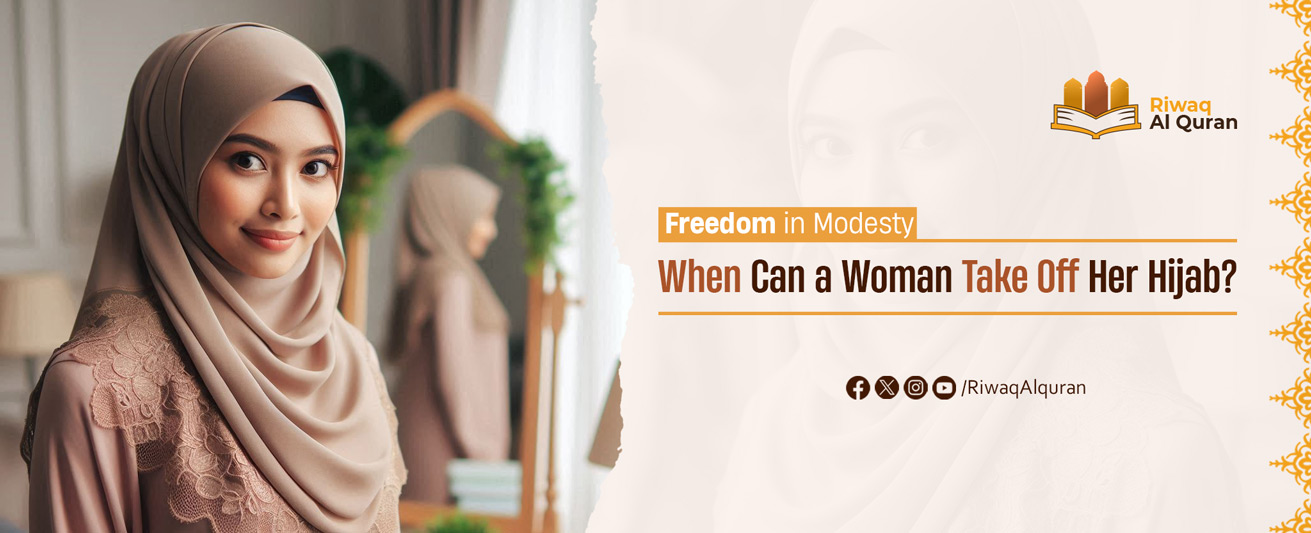Women can take off her Hijab in front of close family and elderly women, but should keep their hijab on around others, like non-mahram men, to maintain privacy and respect. It’s a way of living with grace and integrity, guided by Quranic teachings and tradition, ensuring every glance and interaction reflects values cherished deeply.
The hijab is a significant aspect of Islamic faith and culture, representing modesty, privacy, and moral conduct. Understanding when it is permissible for a woman to remove her hijab is crucial for observing Islamic guidelines while navigating various social contexts.
The guidelines for wearing and removing the hijab in Islam are based on Quranic verses and Hadiths. These guidelines allow flexibility based on cultural contexts, safety considerations, and personal circumstances, helping Muslim women practice their faith thoughtfully and respectfully.
Table of Contents
When can a woman take off her hijab?
The hijab is a religious obligation for Muslim women, symbolizing modesty, faith, and obedience to Allah. However, there are specific situations where a woman may temporarily remove her hijab, provided it is done within the boundaries of Islamic law. Below, we explore the circumstances under which a woman can take off her hijab, emphasizing the principles of necessity and modesty.
1. In the Presence of Mahram Men
A woman is not required to wear the hijab in the presence of her mahram men. Mahrams are male relatives with whom marriage is permanently prohibited, such as her father, brothers, sons, uncles, and nephews. The Quran states:
“And tell the believing women to lower their gaze and guard their chastity, and not to reveal their adornments except what normally appears. Let them draw their veils over their chests, and not reveal their ˹hidden˺ adornments except to their husbands, their fathers, their fathers-in-law, their sons, their stepsons, their brothers, their brothers’ sons or their sisters’ sons…” (Quran 24:31)
In such cases, a woman can remove her hijab as these individuals are not considered strangers.
2. Among Other Women
A Muslim woman does not need to wear the hijab when she is in the company of other women. The Quran specifies:
“…or their women, or their female slaves, or male attendants with no desire, or children who are unaware of women’s nakedness.” (Quran 24:31)
This means she can dress comfortably and modestly among other women without the obligation of covering her hair.
3. In Private Spaces
A woman can remove her hijab in the privacy of her home, where no non-mahram men are present. This includes being alone or with her husband. The hijab is primarily required in public spaces or in the presence of non-mahram men.
4. During Times of Necessity or Emergency
Islamic law allows for exceptions in cases of necessity or emergency. For example, if a woman is in a situation where removing her hijab is essential for her safety, health, or well-being, she may do so. The Quran states:
“But whoever is compelled by necessity, neither desiring nor transgressing, there is no sin upon them. Indeed, Allah is Forgiving and Merciful.” (Quran 2:173)
This principle applies to situations such as medical emergencies, where removing the hijab is necessary for treatment.
5. Milk Brothers and kinship
A lot of people don’t know that there’s such a thing as milk brothers in Islam. If it’s your first time hearing about it, milk brother means a man who got breastfed by your mother. Or, a man whom you breastfed from his mother.
When a man and a woman have been breastfed by the same woman, they’re considered milk siblings, and they’re permanently unmarriageable, which means the man is a mahram.
According to Bukhari (2645), the Prophet Muhammed said (It is forbidden to breastfeed what is forbidden from parentage). In other words, your milk brother gets the same treatment in Islam as your actual brother. You can’t marry him, and you don’t have to wear your hijab in front of him.
There’s been a debate on this topic regarding your milk brother’s brothers. Are they mahrams too?
No, Islam’s rulings are clear about this. Only your milk brother is a mahram. Neither his father nor his brothers are. In other words, it’s permissible for you to marry one of his brothers, and you can’t take your hijab off in front of them.
6. In Front of Her Husband
A woman is not required to wear the hijab in front of her husband. In fact, Islam encourages intimacy and beauty within the marital relationship. The Quran says:
“They are clothing for you, and you are clothing for them.” (Quran 2:187)
This verse highlights the closeness and mutual comfort between spouses.
7. When Alone
When a woman is alone, she is not obligated to wear the hijab. The hijab is meant to protect her modesty in the presence of others, particularly non-mahram men. In private, she can dress as she pleases, as long as she maintains her dignity and modesty.
Important Considerations
While there are exceptions to wearing the hijab, it is crucial to remember that the hijab is a religious obligation and a symbol of faith. Removing it should only be done within the boundaries set by Islamic law. Women should strive to maintain their modesty and adhere to the principles of hijab in all other circumstances.
Experience Riwaq Al Quran Classes
Watch real moments from our live sessions at Riwaq Al Quran and see how we bring learning to life. These clips highlight our interactive, student-focused approach designed to keep learners engaged, motivated, and actively involved in every step of their educational journey.
Hijab significance in Islam
The Muslim woman is obliged to wear shar‘i hijab (hijab as prescribed in Islamic teachings) in obedience to Allah and His Messenger, and to protect and maintain her honor, good conduct, religious commitment, and purity.
The hijab is more than just a piece of clothing; it is a significant aspect of Islamic practice representing modesty, privacy, and moral conduct. The concept of hijab is rooted in the Quran and Hadith, emphasizing modesty for both men and women.
What Can a Woman Reveal in Front of Her Mahrams?
A woman can sit without a hijab in front of her mahrams, but that doesn’t mean she can wear too revealing clothes. There are still some guidelines to abide by, especially if the woman doesn’t trust all her mahrams.
According to Shaykh Muhammad Saalih ibn ‘Uthaymeen, a woman can reveal her face, neck, arms, calves, and feet in front of her mahrams. However, she should cover the rest of her body to prevent unnecessary reactions.
Rulings on hijab for elderly women in Islam?
In Islam, elderly women generally refer to those who have reached advanced age, often past menopause, and are usually considered to be at a stage of life in which certain social and religious expectations have been modified.
Older women may have more flexible rules regarding hijab. Surah An-Nur (24:60) states that it is not a sin for old women to remove their clothes unless they display their beauty.
Who Cannot See a Woman Without a Hijab and Why?
Non-mahram men, or those who a woman can potentially marry, should not see her without a hijab to uphold modesty and privacy. This includes strangers, male friends, colleagues, and brothers-in-law.
The guidelines help maintain respect and moral conduct by Islamic values, protecting the dignity and integrity of women by fostering a community based on respect and proper interaction.
What are the Non-Mahram Men?
Non-mahram men are those who a woman can theoretically marry. They should not see a woman without her hijab to maintain modesty and prevent unnecessary interaction that could lead to inappropriate behavior or thoughts. This includes:
- Strangers: Men who are not related by blood or marriage.
- Male Friends and Acquaintances: Any man who is not classified as mahram.
- Male Colleagues: Coworkers and others in a professional setting.
- Brothers-in-Law: While they may be considered family, they are not mahram, and thus, the rules of modesty still apply.
The guidelines aim to uphold modesty and privacy. Ensuring that non-mahram men do not see a woman without her hijab, maintains respect and prevents inappropriate interactions. These rules protect a woman’s dignity and integrity, fostering a community where respect and moral conduct are prioritized.
To enhance your understanding of hijab and Islamic jurisprudence, we invite you to enroll in our program by clicking here. You can also explore our diverse range of courses here to expand your knowledge further.
Can a woman sit without a hijab in front of her half-brother?
Yes, a half-brother—brother from the same mother—is a mahram, so he can see his sister without a hijab. However, the same doesn’t apply to step-brothers who don’t share a blood relation.
Can a woman sit without a hijab in front of her brother-in-law?
No, a brother-in-law isn’t a mahram, so she must wear her hijab in front of him.
Can a woman sit without a hijab in front of her stepfather?
Yes, a step-father is permanently unmarriageable for a woman, so she can take off her hijab when he’s around.
Can a woman sit without a hijab in front of her stepmother’s brothers?
No. A stepmother’s brothers don’t get the same treatment in Islam as uncles. They’re not mahrams because they don’t share a blood relation, and they’re strangers, so they can’t see you without a hijab.


Why Students Love Learning with Riwaq Al Quran
Hear directly from our students about how Riwaq Al Quran Academy has transformed their connection with the Book of Allah. Their experiences reflect the dedication, care, and quality that guide every step of our teaching.
Learn Quran, Arabic, And Islamic Studies Online With The Best Native Tutors
Riwaq Al Quran is a comprehensive online platform that offers personalized Quran, Arabic and Islamic Studies Online classes for individuals of all ages and backgrounds.
Their experienced instructors use a structured curriculum to cover Tajweed, Tafsir, and Memorization, providing easy and effective access to learning the Quran.
The advanced online classes allow for seamless communication and interaction between students and teachers. Join Riwaq Al Quran for a deeper connection with the Quran.
We offer several courses such as:
- Online courses for kids.
- Online Quran classes for kids and adults.
- Online Arabic courses
- Online Ijazah courses
- Online Islamic Studies courses.
Here are a sample of our set of Quran Courses that will be helpful for you:
- Online Tafseer Course: Delve into Quranic meanings with our insightful online Tafseer course.
- Noorani Qaida Online: Learn Quranic basics efficiently through our Noorani Qaida online program.
- Online Quran Recitation Course: Enhance Quranic recitation skills through our expert-led online course.
- Online Tajweed Classes: Master Tajweed rules for beautiful Quranic recitation in online classes.
- Quran Memorization Online Course: Memorize the Quran effectively with our specialized online memorization course.
- Online Qirat Course: Explore diverse Qirat styles with our comprehensive online Qirat course.
- Online Quran Classes for Kids: Nurture a love for the Quran in kids through interactive online classes.
Conclusion
The hijab is a significant aspect of a Muslim woman’s identity and faith. While there are specific situations where it can be removed—such as in the presence of mahram men, among other women, or during emergencies—these exceptions are limited and should not be taken lightly. The hijab remains a powerful expression of devotion to Allah and a commitment to Islamic values.
Muslim women are obligated to wear the shar‘i hijab as prescribed in Islamic teachings, safeguarding their honor, religious commitment, and purity. Women can reveal their hijab in front of mahram men—those who are permanently unmarriageable—such as fathers, brothers, and sons, as well as in front of elderly women, but should maintain modesty guidelines even with them.
Non-mahram men, including strangers, male friends, colleagues, and brothers-in-law, should not see a woman without her hijab to uphold modesty and respect Islamic values, ensuring dignity and integrity are preserved.
May Allah guide all Muslim women to uphold their faith with sincerity and strength. Ameen.


































